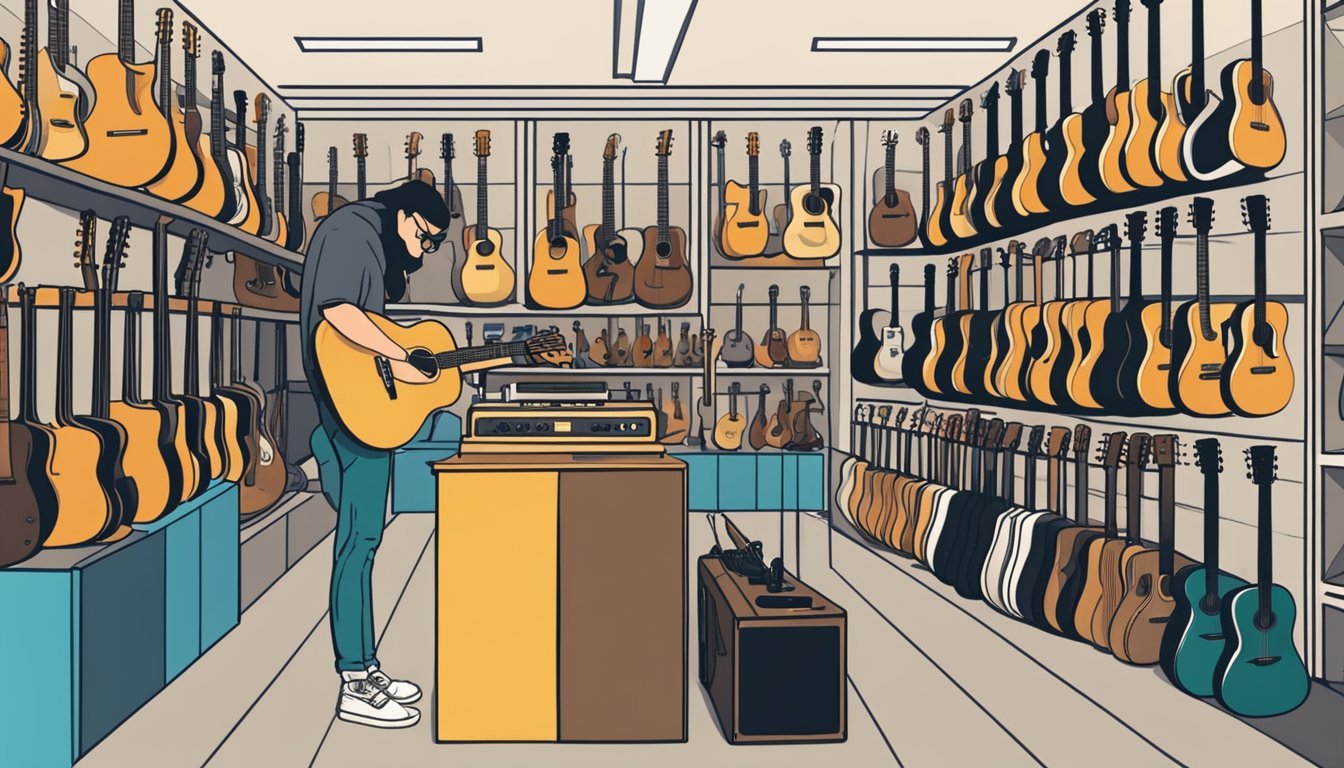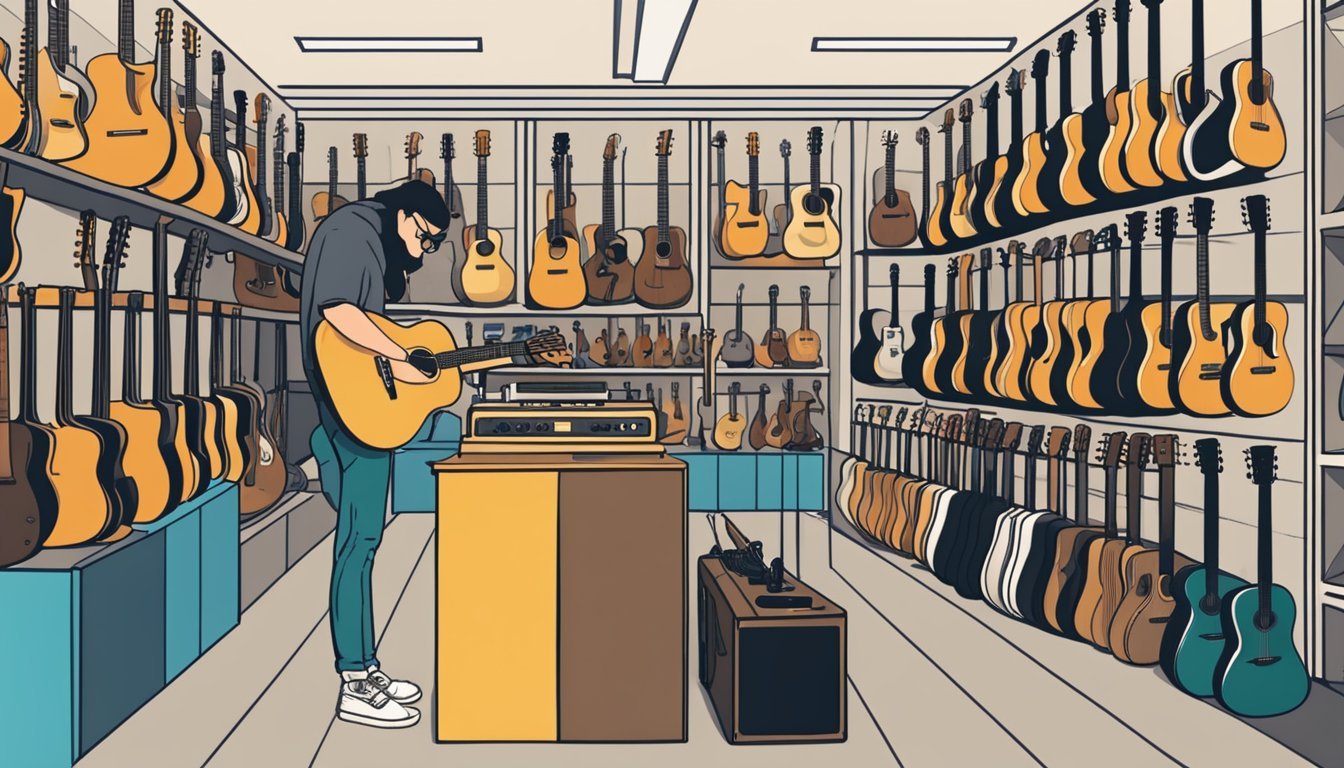Choosing the right guitar can be a bit tricky, especially if it’s your first time buying one.
A great starting point is to decide whether you want an acoustic or electric guitar.
This can heavily influence your playing style and sound.
By knowing the type of music you love, you’ll be better equipped to choose the instrument that fits you best.

Once you’ve made that choice, think about how the guitar feels in your hands.
Comfort is key, and different guitars suit different sizes and playing styles.
Also, knowing some top recommendations for beginner guitars can save you time and money, ensuring you make a smart choice right from the start.
Key Takeaways
- Decide between an acoustic or electric guitar based on your musical preference.
- Comfort and playability are essential for an enjoyable playing experience.
- Research beginner-friendly guitars to make your purchase easier.
Finding Your Sound: Electric vs. Acoustic
Choosing between an electric and acoustic guitar can shape your musical journey.
Each type has its unique characteristics that can influence your style and sound.
Electric Guitar: The Path to Rock Stardom
If you’re drawn to genres like rock, blues, or pop, an electric guitar might be your best bet.
Electric guitars use pickups to convert string vibrations into sound, which means you can use an amplifier for volume and effects.
Popular Features:
- Solid-body guitars offer great sustain and a variety of tones.
- Lighter strings make playing easier, especially for beginners.
- Many electric models allow for customization of sound through effects pedals.
The variety of tones you can achieve helps define your sound.
Look for models with quality tonewoods like mahogany for warmth or maple for brightness.
Some great beginner options include the Fender Stratocaster or the Epiphone Les Paul.
Acoustic Guitar: The Classic Choice
If you prefer a more traditional sound, the acoustic guitar might suit you better.
This type produces sound naturally through its hollow body, making it perfect for folk, country, or singer-songwriter styles.
Key Benefits:
- No need for an amplifier—just pick it up and play.
- The body shape affects the sound: dreadnoughts offer a powerful tone while concert models are lighter and easier to hold.
- Great for strumming open chords and rhythmic patterns.
Look for solid-top models made with quality tonewoods like spruce or cedar for a richer sound.
The Yamaha FG series or the Martin DX1AE are excellent picks for beginners wanting a reliable instrument.
With an acoustic, you can easily share music anywhere, making it a great choice for casual jam sessions.
Evaluating Playability and Comfort
Finding the right guitar is not just about looks or brand.
You need to consider how it feels when you play.
Key factors include the guitar neck, fretboard, and body shape.
These aspects help ensure that you enjoy every strum and riff.
Guitar Neck and Fretboard Considerations
The neck of the guitar plays a huge role in how comfortable it feels in your hands.
A guitar neck that is too thick may feel awkward for smaller hands, while a thin neck can be easier to maneuver for quicker playing.
Next, think about the fretboard radius.
A flatter fretboard (like 12 inches) can be better for bends, making it easier to play lead guitar.
On the other hand, a rounder fretboard (like 7.25 inches) is often easier for chords.
Also, check the action, which is how high the strings are above the fretboard.
Lower action can make fretting easier but might cause buzzing if the strings are too low.
Make sure to test different neck shapes and fretboard radii to find what feels best for you.
Understanding Guitar Body Shapes and Sizes
The shape and size of the guitar body affects both playability and comfort.
Different body types fit against your body differently.
For instance, a dreadnought acoustic has a larger shape, which some find hard to hold.
In contrast, a slimline electric body is easier to grip.
Consider the weight of the guitar as well.
Heavier guitars can be tiring to play for long sessions.
If you’re a beginner or plan to play for hours, a lightweight option may be best.
Top Picks for Beginners
Finding the right guitar as a beginner can be exciting.
You want something that feels good to play and sounds great too.
Here are some top models to consider that fit various needs and budgets.
Start with the Best: Beginner Guitar Models
When you’re just starting, you want a guitar that’s easy to handle and fun to play.
The Squier Bullet Mustang is a fantastic choice.
It has a shorter scale length, making it easier for smaller hands.
Plus, it’s lightweight and delivers a punchy sound as a beginner electric guitar.
Another solid option is the Yamaha Pacifica 112V.
This guitar boasts excellent build quality and versatility.
It works well for various music styles, whether you like rock or blues.
The Squier Classic Vibe ‘50s Strat is also noteworthy.
With classic looks and great tones, you won’t outgrow it anytime soon.
Value for Money: Budget-Friendly Guitars Worth Your Time
If you’re on a budget, there are still amazing guitars out there.
The Epiphone versions of popular models often come at a lower price without sacrificing quality.
You can consider the Fender Stratocaster too.
Though not the cheapest, you might find good deals on used models.
For acoustic lovers, check out the Yamaha FG800.
It’s durable with a solid spruce top that produces a clear sound.
Investing in a quality beginner guitar can enhance your playing experience.
Choose one that feels right for you, and you’ll enjoy every moment spent strumming!
Accessories and Enhancements
Getting the right accessories and enhancements can really improve your guitar experience.
Whether you’re just starting or looking to upgrade, knowing what to invest in helps you make the most of your music journey.
Essential Accessories for Your New Guitar
When you buy a guitar, several accessories can help you play better and protect your instrument.
Here’s a quick list of must-haves:
- Guitar tuner: A clip-on tuner like the Korg Pitchclip 2 is easy to use and makes tuning a breeze.
- Capo: This handy tool allows you to change the pitch without learning new chords. They are affordable and essential for many songs.
- Guitar picks: Different thicknesses can change your sound. Try a few to find what feels right for you.
- Guitar case or gig bag: Keeping your guitar safe is crucial. A padded case offers protection while traveling.
It’s also smart to consider investing in quality strings and a cleaning kit to maintain your guitar’s tone and longevity.
Amplifiers: Making the Right Choice
Choosing the right amplifier can greatly enhance your sound.
Whether you’re practicing at home or playing live, the right amp can make all the difference.
Begin with a simple practice amp if you’re just starting, which will give you clean sound without breaking the bank.
Brands like Fender and Boss offer good options.
For electric guitars, consider how pickups affect your tone. Single-coil pickups provide bright, clear sounds, while humbucker pickups offer a warmer, fuller sound.
If you want to explore more options, check out platforms like Sweetwater and Reverb for various choices.
You might also think about taking some guitar lessons to learn how to use your amp effectively.
Frequently Asked Questions
When starting your guitar journey, you’ll have plenty of questions.
Here are some common ones that many beginners and intermediate players ask to help make their choice easier.
What’s a good starter guitar for a total newbie?
A solid option for newbies is the Yamaha FG800 acoustic.
It has a nice sound, is affordable, and is user-friendly.
Also, the Squier Bullet Stratocaster is great for electric guitar beginners, offering good playability and a classic design.
Any ideas on the best electric guitar for a first-timer?
The Fender Squier series is often recommended for first-timers.
Models like the Squier Affinity Stratocaster or Telecaster are versatile and budget-friendly.
They provide decent sound quality and can grow with your skills.
Should I go acoustic or electric as my first guitar?
It often depends on your music style.
If you prefer strumming and singing, an acoustic like the Taylor GS Mini might be better.
If you want to play rock or blues, an electric guitar like the Squier might suit you more.
What’s the deal with guitar picks, and which one should I get?
Guitar picks, or plectrums, help with strumming and picking.
For beginners, a medium thickness pick (around 0.73mm) is a good start.
You can try different materials and thicknesses to see what feels best for your playing style.
Are there any solid guitars out there for an intermediate player?
For those with some experience, consider the Fender Player Series or Epiphone Les Paul Standard.
Both offer great sound and solid build quality.
They are versatile enough for different music styles and can help you improve your skills.
Additionally, these instruments are designed to withstand regular use, making them ideal for practicing or performing.
As you explore various genres, you’ll appreciate the craftsmanship and reliability that come from some of the best guitar brands for musicians.
Investing in a quality guitar not only enhances your sound but also boosts your confidence as you grow in your musical journey.
His fav celebs play on which guitars, and should that sway my choice?
Many famous guitarists have their signature models.
For example, Eric Clapton has a Fender Stratocaster and Jimmy Page has a Gibson Les Paul.
While it can be fun to have a guitar similar to your favorite artist, pick one that feels right for you and suits your playing style.

